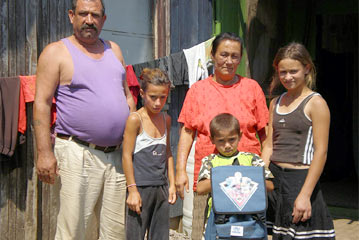Roma refugees see music as their route to self-reliance
Roma refugees see music as their route to self-reliance

SKOPJE, the former Yugoslav Republic of Macedonia, January 15 (UNHCR) - Membership in The Roma Talents, the one and only refugee band in Suto Orizari, may not make Roki and his friends famous. But they have seized a chance for self-reliance that relatively few Roma refugees have managed.
When I visited them in one of their rented homes in Suto Orizari municipality in Skopje, the capital of Macedonia, I recalled the first time I had seen Roki. In 1999 he had arrived in the country as a 12-year-old boy holding his parents' hands and trying to understand the events around him.
His father, an educated artisan, tried to cover his son's face with his coat so he would not see the misery of thousands of people fleeing their homes in Kosovo, making their way through the muddy no man's land towards a safe haven in Macedonia. As part of the flow of more than 350,000 refugees, he and his friends had experienced the refugee camps in Stenkovec and Katlanovo before finally finding a home in a rented apartment.
Now, nine years later, the seven Roma refugees warmly greeting me in Roki's cramped home - Roki himself along with Fadil, Rahman, Mirsad, Basri, Arben and Valdet - are not just ordinary young people, but The Roma Talents. They saw their chance three years ago when the Swedish Royal Music Academy offered the refugees in Macedonia musical instruments and a chance to learn to play, in the hopes that one day they would support themselves.
"It was not easy," explains Valdet, the youngest member of the band at only 14 years old. The aroma of Roki's mother's fresh cookies fill the room, his younger sister is knitting a colourful shawl for a New Year's party the refugee youth are organizing. Jazz plays from a small portable radio.
The band started to practise in UNHCR's Skopje premises, each day from five in the afternoon until late - sometimes midnight. In a couple of months, the initially grating sounds emanating from the room became pleasant melodies.
In six months, they started to perform in front of an audience: first at small parties organized by the UNHCR office. At one of these, the renowned Roma singer Esma Redzepova Teodosievska joined them on stage. Then, the municipality of Suto Orizari started to invite the band to perform at events and official ceremonies.
But the most important thing for the seven members of the band is that they have started to earn money by playing at local weddings. They are among the few Roma refugees in Macedonia who have realized that self-reliance is the only way out of their difficult refugee reality and have taken their chance to make a living.
Macedonia still hosts around 1,900 refugees, mainly Roma from Kosovo. Regrettably, the members of The Roma Talents are among the few refugees successfully managing their way towards their self-reliance.
"In the beginning, people were looking at us with surprise, which sometimes turned into fear when they heard that we are refugees. But, the music was bringing us close to each other. Now, I have many friends in Skopje," said Valdet.
In 2007, the band released their first CD, which contains 12 traditional Roma songs from the Balkans.
"Of course we are still facing a lot of problems, mainly financial. Maintenance and spare parts for these very sophisticated instruments are extremely expensive, and we no longer receive assistance for their purchase," explains Fadil Berisha, the oldest member of the band.
"But we have to continue practising and performing," he says. "It is our only way out."
By Aneta Galic in Skopje, former Yugoslav Republic of Macedonia








